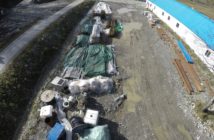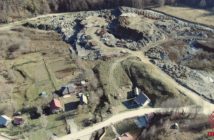Podgorica, 23 November 2010 – The Government’s recently adopted Concession Act for the building of dams on the Morača river confirmed the predictions we have been making throughout the public consultation process. All of the
comments and suggestions made by civil society representatives – including those submitted by MANS, Green Home and Forum 2010 – were wholly rejected by the government, without any explanation.
On the other hand, the comments and suggestions made by the Italian energy company A2A – one of the frontrunners in the bid for the Morača concession – were mostly accepted. It will be a huge surprise to everyone if any other company but A2A wins the tender.
In its comments on the draft concession agreement, A2A made the following suggestion: “In order to create a more flexible project proposal, we suggest that you include the possible (though limited) extension of the territory related to the hydropower concession, especially in the Morača valley up to
Zlatica (at the point where the Morača river joins the Zeta river) and in the Mala Rijeka valley, approximately until the end of the rail-bridge Bar-Belgrade, in order to offer the possibility of building other dams.”
Along these lines, the adopted version of the Concession Act foresees that the “potential area [of the concession]includes the main course of the river upstream until the convergence of the Zeta and Marača,” while the alternative solutions are also limited to that projected region.
With this, the process of meeting the demands of the future
concession-holder continues, including the lack of a precisely defined concession object (simply called a ‘potential area’ in the concession documents). This puts Montenegro in a situation where the state is negotiating and defining the borders of concessional exploitation with the future concession holder, outside of the public’s eyes. Even Montenegro’s Parliament will be presented with a fait accompli; elected representatives will be left with few more options than rubber stamping an already concluded deal.
The government will do the same with the Detailed Spatial Plan for the concession offer, which will again mean adapting that planning document to the specifications outlined in direct talks between the future concessionaire and the Ministry of Economy. Here there is no need to waste words on the effectiveness of a public debate concerning a document whose key elements have already been agreed upon.
As far as economic indicators are concerned, the final version of the Concession Act does not contain the Government’s more optimistic projections. Instead, the projections for Technical Solution 1, for the period 2011-2016, foresee GDP growth in relation to this base-scenario reduced from 390- to 204-million euros in nominal prices (or from 346- to 186-million euros in relation to constant 2010 prices). Similarly, the projected growth in per capita GDP for the same period, in relation to the base-scenario, has been reduced from 608 euros to 322 euros measured in nominal prices (or from 540 to 294 euros measured in constant 2010 prices).
Even these revised government projections are supported only by the proclamations of Branko Vujović, the Minister of the Economy, who along withhis staff are the only ones who’ve seen the cost-benefit analysis prepared by the Swedish agency Poyry. Nor has anyone seen the infamous economic analysis that was prepared by a team of domestic experts who still remain anonymous for the public.
With all due respect to Minister Vujović, we would rather believe with our eyes than accept the version of the truth that he and people in the Ministry of Economy are attempting to impose on the public. We agree with him that
the projected dams on the Morača river are profitable, but we don’t agree with him that the benefits will actually be reaped by the state-budget or by the country’s citizens. Until Minister Vujović supports his claims with economic indicators that will clearly delineate the actual benefits of this project – including the potential risks associated with the various scenarios for harnessing the hydropower potential of the Morača – we will reserve our judgement on the credibility of his claims (including those of the virtual army of coodrinators and experts that surround him).
In light of the fact that the entire process for introducing the Concession Act was accompanied by dramatic violations of the Law on Concessions, we have no reason to believe anything that Minister Vujović or his Ministry tells us.
It is very clear to everyone why the project for the construction of dams on the Morača is beneficial to the future concession holder. However, we would like to once again call upon the Minister of Economy to make public all of the economic studies that are the alleged basis for his conclusions that this project will also be beneficial for Montenegro’s citizens. This assumes, naturally, that he hasn’t already forgotten whose interests he is officially paid to represent in this project.
Dejan Milovac
Deputy Executive Director
Urban Development Programme Director



